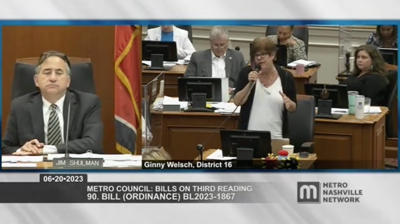@startleseasily is a fervent observer of the Metro government's comings and goings. In this column, "On First Reading," she'll recap the bimonthly Metro Council meetings and provide her analysis. You can find her in the pew in the corner by the mic, ready to give public comment on whichever items stir her passions. Follow her on Twitter here.
On Tuesday, the Metro Council elected an interim successor to late state Rep. Bill Beck's seat, passed a $3.2 billion budget, and struggled to fill seats on the newly created Music, Film and Entertainment Commission.
This Is What Democracy Looks Like?
On Tuesday, Councilmember Emily Benedict nominated former CM Anthony Davis to fill the late Bill Beck’s seat in State House District 51 until the special election in September. Aftyn Behn, a progressive organizer who’s positioning herself as Davis’ main competitor in the Democratic primary, says her campaign spoke to several CMs in an effort to secure a nomination. She demurred when I asked her to name names, saying that she “was very upset last night” but is “only looking ahead.” In any event, the snub may redound to her benefit, with some voters viewing it as a subversion of the democratic process.
CM Erin Evans abstained on the vote to appoint Davis. She says she favored waiting until after the Aug. 3 primary to vote on an interim successor, like the Shelby County Commission did earlier this year after the passing of longtime Rep. Barbara Cooper, but she understood her colleagues’ desire to ensure a “smooth transition.” Benedict, for her part, didn’t feel comfortable waiting. “People want to be represented,” Benedict says, noting that state representatives work on constituent issues year-round, not just when the legislature is in session.
Friends in Slow Places
The council went on to waste nearly two hours bumbling through a series of appointments to the newly created Music, Film, and Entertainment Commission, providing just about the best use case I’ve ever seen for the benefits of ranked choice voting. The state legislature has outlawed RCV in actual elections, but surely that prohibition can’t extend to the halls of the Historic Metro Courthouse. CM At-Large Bob Mendes, the council’s resident Nostradamus, warned his colleagues that this would happen back on June 6, saying he hoped “something congeals between now and then.” Things remained unfortunately liquid.
Garth Brooks was one of a slate of nominees by CM Joy Styles, though it’s unclear whether he actually knew he had been nominated. His nomination wasn’t considered by the council, nor was that of Brooks’ famed alter ego Chris Gaines, who received a last-minute nod by class clown Freddie O’Connell.
Same Old Song and Dance
The council didn’t take up the $3.2 billion budget until well into the evening. The council ultimately approved the substitute budget proposed by Budget and Finance Committee Chair Kevin Rhoten. As per usual, the substitute just barely tinkered around the outer edges of the mayor’s proposal, with changes totaling less than 0.5 percent of the budget. The biggest change was an increase in the cost-of-living adjustment for Metro employees from the 4 percent proposed by the mayor to 6 percent in the chair’s substitute. This change didn’t impact Metro Nashville Public Schools employees, who will receive only a 4 percent COLA.
Among the most hotly contested amendments was an attempt by CMs Zulfat Suara and Delishia Porterfield to fund the $6 million purchase of the Morris Memorial Building for proposed use as an African American history museum and Metro office space. Mike Jameson of the mayor’s office shared that, although “the mayor is deeply enamored of the building,” the environmental remediation of extensive lead and asbestos would cost around $40 million. As CM Benedict pointed out, though, this mayor has a storied history of purchasing old buildings with no clear plan for how to use them. The amendment failed, but multiple CMs expressed a desire to see the building purchased through a future capital spending plan.
Two amendments — one from CM Courtney Johnston and another from CM Porterfield — would’ve raised the COLA to 6.5 percent and 7 percent, respectively. Both amendments failed, with CM Rhoten arguing against further increases. He expressed frustration over being pushed to agree to a 6 percent COLA, saying, “The only reason I agreed to do it is because all of you said that you were going to do even more if I didn’t give the 6 percent.” Peer pressure works, kids!
The money to fund the extra increases would’ve come from cuts to several departments, like Metro Parks and the Nashville Department of Transportation, with a history of large numbers of unfilled positions. The CMs intended for the cuts to come out of these vacant positions — in essence, departments just wouldn’t be able to fill positions that they can’t fill anyway — but department heads threatened to cut services instead. As CM Kyonztè Toombs put it, departments “would rather hold on to unfilled positions — nonexistent people — and cut services.” CM Zach Young denounced departmental “scare tactics,” adding, “So you’re telling me if we cut money from Parks, they’re going to keep all the golf courses open ... but they’re going to close community centers on Saturdays?”
CM Ginny Welsch withdrew all of her amendments, which would’ve redistributed some of the Metro Nashville Police Department’s wealth to other departments, but not before delivering a floor speech that brought the (court)house down. She chastised her colleagues for prioritizing policing over every other approach to public safety and called out the chronic underfunding of Fire and EMS. “If we don’t change our path, pretty soon, we’re going to be nothing but a police state and a playground for the rich,” Welsch concluded, to raucous applause from the gallery.
The song of the summer is here, friends. Aaron Lee Tasjan performed his soon-to-be smash hit “I Love America Better Than You” on Tuesday night. Because what is a council meeting really, if not an interminable open mic night?





